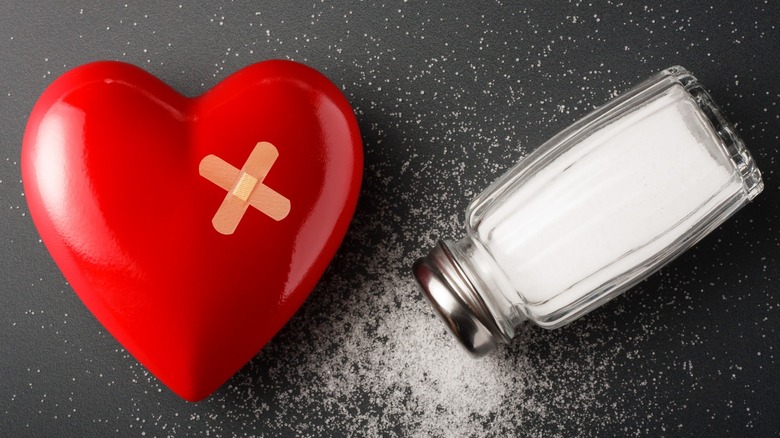What Can Happen When You Consume High Amounts Of Salt And Not Enough Potassium
Sodium and potassium are key electrolytes that are vital for your health. This is because these minerals work together to transport electrical currents throughout your body and support the maintenance of important functions, such as blood pressure and fluid volume. Consequently, it is crucial that you maintain sodium and potassium at certain levels. If they are not in proper balance, this could lead to potentially serious issues (per MedicalNewsToday).
While often used to describe the same thing, it is worth noting that sodium and salt are a little bit different. Sodium chloride is the main ingredient in table salt, but salt can also be made up of other chemical elements. Even so, consuming high amounts of salt is often what can lead to high levels of sodium in your system. Maintaining a proper sodium level is essential in supporting cells in their absorption of nutrients and maintaining an optimal level of fluids, according to the Centers for Disease Control and Prevention (CDC).
Potassium is kind of like sodium's partner in crime. When a potassium ion enters a cell, a sodium ion leaves the cell. This also works the other way around. It is therefore also vital to maintain the right amount of potassium to maintain healthy heart function otherwise there is a chance you can experience certain health issues.
Your kidneys also play an important associated role, as they remove excess sodium and potassium by way of your urine. You can also get rid of excess potassium and sodium by sweating, says Cleveland Clinic.
How you can tell if you're consuming too much salt
While our bodies require higher levels of potassium than sodium, most Americans eat over 1.5 teaspoons of salt daily, which exceeds what our body needs, according to Harvard T.H. Chan School of Public Health. Consequently, people who consume a high ratio of salt or other sodium products compared to potassium are at a much higher risk of developing cardiovascular disease, according to a study published in the Archives of Internal Medicine.
Additionally, consuming too much salt and not enough potassium appears to potentially lead to cognitive decline. While more research is needed, results from a recent Chinese study suggest that high sodium intake leads to a deterioration in memory function while higher potassium levels are associated with improved cognitive function (via Healthline). Other studies also suggest that high sodium levels may cause cognitive issues due to the negative impact on cells called endothelial cells, which line the inside of the brain. Additionally, some research indicates that too much sodium may cause a protein called tau to clump, which may lead to dementia.
Symptoms of high sodium include thirst, infrequent urination, twitching muscles, and diarrhea, among others. To confirm whether your sodium levels are too high (or too low), you can take a sodium blood test. Based on these and other test results, your doctor can determine the best course of action (per MedlinePlus).
To avoid the risk of high sodium, swap out processed foods for foods that are naturally low in sodium such as fruits and veggies, per Healthline.


